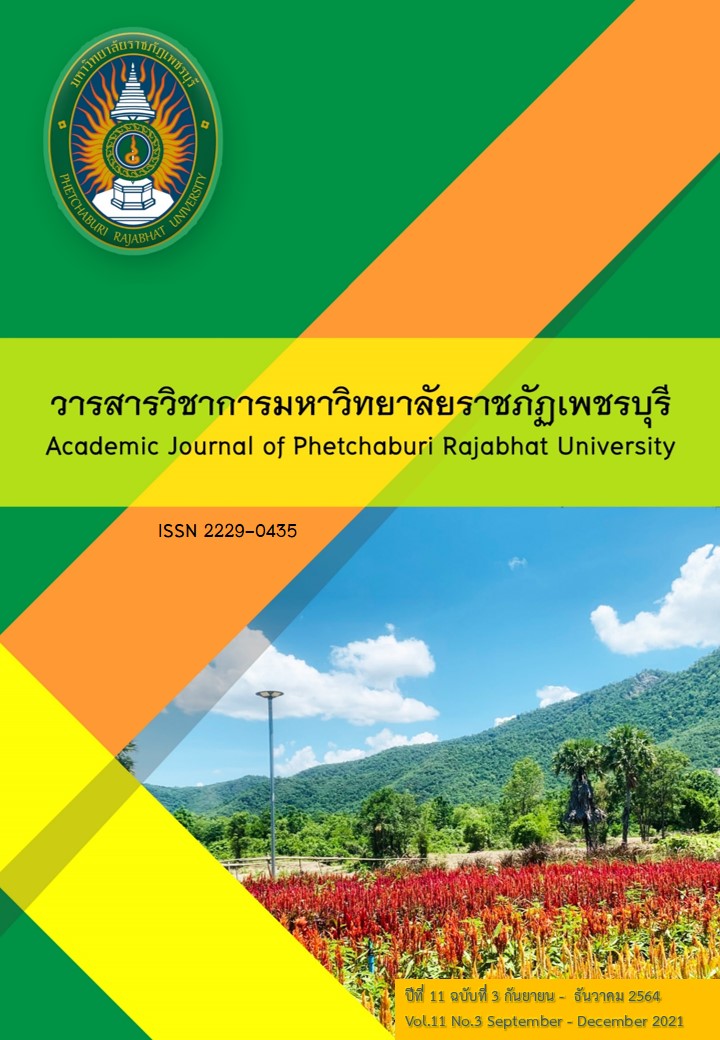การพัฒนาหลักสูตรออนไลน์ภาษาอังกฤษสำหรับวิทยาศาสตร์และเทคโนโลยีเพื่อเพิ่มผลสัมฤทธิ์ทางการอ่านของผู้เรียนภาษาอังกฤษเพื่อวัตถุประสงค์เฉพาะ
Main Article Content
บทคัดย่อ
The objectives of this study were 1) to develop Online English for Science and Technology course (O-EST) to enhance the English reading proficiency of undergraduate students based on the efficiency criterion determined at75/75, 2) to compare students’ reading proficiency scores before and after applying for the online course, and 3) to examine students’ satisfaction toward the online course. The samples, which were purposively selected, comprised of 67 students majoring in Information Technology and Computer Engineering. The research instruments were the O-EST course, a reading proficiency test, a satisfaction questionnaire, and a reflective journal. Data were analyzed by percentage, mean, standard deviation, and t-test while the data from the reflective journal were analyzed via thematic analysis. The results yielded that 1) the efficiency of the course was 75.97/77.56 which was higher than the designated value, 2) the reading proficiency score after applying course was higher with a statistically significant difference at the level of 0.05, and 3) The students’ satisfied level toward the course was high (= 4.37, S.D. = 0.63).
Article Details
บทความนี้ยังไม่เคยลงตีพิมพ์ในวารสารใดมาก่อน และไม่อยู่ระหว่างการพิจารณาของวารสารอื่น
บทความที่ลงพิมพ์เป็นข้อคิดเห็น/แนวคิด/ทัศนคติของผู้เขียนเท่านั้น หากเกิดผลทางกฎหมายใดๆที่อาจ
เกิดขึ้นจากบทความนี้ ผู้เขียนจะเป็นผู้รับผิดชอบ และบทความนี้เป็นลิขสิทธิ์ของวารสารเท่านั้น
เอกสารอ้างอิง
[2] Venkatraman G, Premak P. English language skills for engineering students: a needs survey
[Internet]. 2007 [cited 2021 Jan 10]. Available from http://www.esp-world.info/contents.htm.
[3] Tsai YR, Chang Y. Enhancing Engineering Students’ Reading Comprehension of English for Science and Technology with the Support of an Online Cumulative Sentence Analysis System. SAGE
Open. 2014; 4: 1–9.
[4] Saengpakdeejit R. English reading strategies employed by science-oriented students in public universities. [dissertation]. Nakhon Rachasima: Suranaree University of Technology; 2009.
[5] Charoenpong C. Strategies and problems in reading academic journal articles for undergraduate chemistry students. [thesis]. Bangkok: Thammasat University; 2010.
[6] Seels B, Glasgow Z. Making instructional design decisions. 2nd ed. Columbus: Prentice Hall; 1998.
[7] Corbin M, Strauss L. Basics of qualitative research: techniques and procedures for developing grounded theory. 3rd ed. Thousand Oaks: Sage; 2008.
[8] Candlin C. The communicative teaching of English: principle and an exercise typology. London: Longman group Co. Ltd.;1987
[9] Nunan D. “Aspects of task-based syllabus design. Karen’s linguistic” [Internet]. 2001 [cited 2020 Dec 15]. Available from http://www3.telus.net/linguisticsissues/syllabusdesign.htm.
[10] Velandia R, Torres P. and Ali N. “Using web-based activities to promote reading: an exploratory study with teenagers [Internet]. 2012. [cited 2020 Nov 20]. Available from http://www.scielo.org.co/scielo.php?script=sci_arttext&pid=S1657-07902012000200002.
[11] Spence P, Liu G. Engineering English and the high-tech industry: A case study of an English needs
analysis of process integration engineers at a semiconductor manufacturing company in Taiwan. English for Specific Purposes. 2013; 32: 97-109.
[12] Poedjiastutie D, Oliver R. Exploring students’ learning needs: expectation and challenges. English Language Teaching. 2017; 10: 124-133.
[13] Zidat S, Djoudi M. Effects of an online learning on EFL university students’ english reading
comprehension [Internet]. 2010. [cited 2020 Nov 20]. Available from https://www.researchgate.net/ publication/290332871.
[14] Chaovachuen T. The development of English reading exercises based on authentic materials by using the task-based reading activities for Mathayomsuksa 4 students. (thesis). Nakhom Pathom: Silpakorn University; 2017.
[15] Boonbongkotrat N, Chattiwat W, Nilpan M and Kositchaiwat S. (2020). The development of online reading instructional model through reading comprehension strategies integrating with cognitive academic language learning approach (CALLA) to enhance academic online reading ability and strategy use for undergraduate students. Academic Journal of Phetchaburi Rajabhat University. 2020; 10: 4-12.
[16] Wang YH., Wang CN. (2010) Exploring EFL Taiwanese university Students’ perceptions of a collaborative CALL environment. In: Pan JS., Chen SM., Nguyen N.T. (eds) Computational Collective Intelligence. Technologies and Applications. ICCCI 2010. Lecture Notes in Computer Science, vol 6421. Springer, Berlin, Heidelberg. https://doi.org/10.1007/978-3-642-16693-8_44.
[17] Wang Y, Tsao H, and Chen G. Integration of computer technologies into an English language learning classroom. Asian Journal of Empirical Research. 2013; 3: 1389–1400.
[18] Wang Y. Developing and Evaluating an Adaptive Business English Self-Learning System for EFL Vocabulary Learning. Mathematical Problems in Engineering. 2014; 2014: 1–7.
[19] Dehghanpour E, Hashemian M. Efficiency of using a web-based approach to teach reading strategies to Iranian EFL learners. English Language Teaching. 2015; 8: 30-41.
[20] Crookes G, Schmidt RW. Motivation: reopening the research agenda. Language Learning. 1991; 41: 469-512.
[21] Dooey P. Students' perspectives of an EAP pathway program. Journal of English for Academic Purposes. 2010; 9: 184-197
[22] Kalapakdee J, Sangsawang T. Development of online learning self-directed learning on education innovation technology for undergraduate students, Rajamangala University of Technology Thanyaburi. Journal of Vocational and Technical Education. 2016; 6:18-25.


